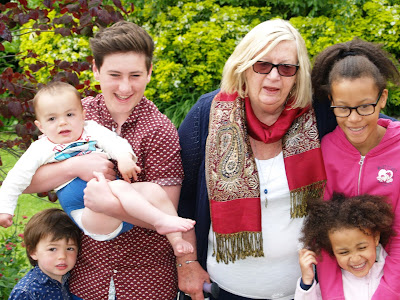This blog may help people explore some of the 'hidden' issues involved in certain media treatments of environmental and scientific issues. Using personal digital images, it's also intended to emphasise seasonal (and other) changes in natural history of the Swansea (South Wales) area. The material should help participants in field-based modules and people generally interested in the natural world. The views are wholly those of the author.
Wednesday, 17 November 2021
Granny Knot
It was suggested, in the 1960's, that women live decades after their reproductive years, because their presence increases their grandchildren's chances of surviving and thriving. An Emory University (Atlanta, USA) study used Magnetic Resonance Imaging (MRI) to scan the brains of 50 women with at least one biological grandchild (https://www.theguardian.com/lifeandstyle/2021/nov/17/grandmothers-may-be-more-connected-to-grandchildren-than-to-own-offspring). The MRI scans were made whilst the women looked at photographs of a) the grandchild; b) the child's parents or c) an unrelated child/adult. The scans strikingly revealed the women showed their highest empathy, when responding to their grandchild's image. This empathy was higher than that shown in response to images of their own children (the parent of the grandchild). The study doesn't, of course, 'prove' the 1960's suggestion about the utility of grandma but it does confirm that these grannies had a special tie to their grandchildren. It would be interesting to repeat the study in a range of family structures (the 'nuclear family' isn't the only model).
Subscribe to:
Post Comments (Atom)
-
I n the UK and US, a pparently popular and successful vegan/vegetarian restaurants are reportedly closing or adding meat to their menus ( ...
-
Early ripening fruit may seem convenient but some folk think it confirms environmental stress. There's also a possibility th...


%20mating%20NWCW.jpg)


No comments:
Post a Comment